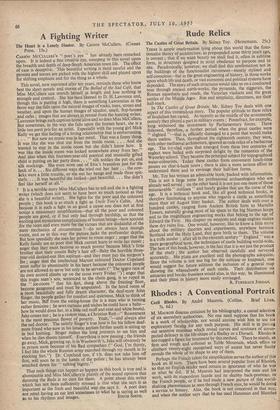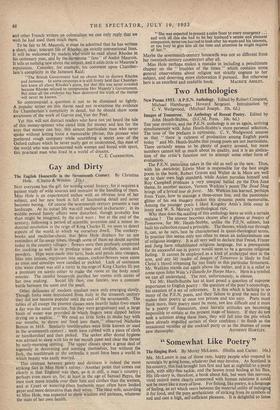Rhodes : A Conventional Portrait
Cecil Rhodes. By Andre Maurois. (Collins. Brief Lives.
7s. 6d.)
M. MAUROIS disarms criticism by his bibliography, a casual selection of six secondary authorities. No one need suppose that his book is a work of scholarship, nor would anyone wish him to use his exploratory faculty for any such purpose. His skill is in putting out sensitive antennae which reveal curves and contours of unsus- pected delicacy in the life-shape of a Shelley or a Disraeli. Rhodes is too rugged a figure for treatment by this method. There he stands, as firm and rough and colossal as Table Mountain, which offers to climbers twenty-eight recognised ways of ascent but never finally reveals the whole of its shape to any of them.
Perhaps the French talent for simplification serves the author of this book an ill turn. There have been several popular lives of Rhodes, so that no English reader need remain in ignorance of who he was or what he did. If M. Maurois had interpreted the man and his work, with its stupendous façade and its shabby back-premises, to the French people, or if he had made a new picture of this world- shaking phenomenon as seen through French eyes, he would be doing a service to history. Alas, the book is not conceived in that way, and when the author says that he has used Hanotaux and Blanchet and other French writers on colonialism we can only reply that we wish he had used them much more.
To be fair to M. Maurois, it must be admitted that he has written a short, clear, tolerant life of Rhodes, on strictly conventional lines. It will be welcomed by readers who want to read about Rhodes in his centenary year, and by the numerous "fans" of Andre Maurois. It tells us nothing new about the subject, and it adds little to Maurois's reputation. Consider, for example, his comment upon Chamber- lain's complicity in the Jameson Raid:
The British Government had no choice but to disown Rhodes and Jameson. In some countries it is still firmly held that Chamber- lain knew all about Rhodes's plans, but that this was never revealed because Rhodes refused to compromise Her Majesty's Government. But since all the evidence has been destroyed the truth of the matter will never be known."
So controversial a question is not to be dismissed so lightly. A popular writer on this theme need not re-examine the evidence for Chamberlain's complicity in detail, but he should show some awareness of the work of Garvin and Van der Poel.
Yet this will not distract readers who have not yet heard the tale of this money-spinner who cared little for money and less for the toys that money can buy, this almost inarticulate man who never spoke without letting loose a memorable phrase, this pioneer who preferred rough company while nourishing a secret awe of the Oxford culture which he never really got or understood, this man of the world who was unconcerned with women and bored with sport, this practical man who lived in a world of dreams.
C. E. CARRINGTON.



































 Previous page
Previous page